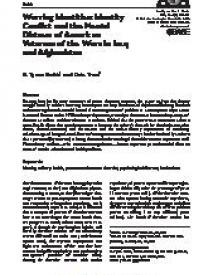Warring Identities: Identity Conflict and the Mental Distress of American Veterans of the Wars in Iraq and Afghanistan
Drawing from 26 life story interviews of recent American veterans, this paper analyzes the identity struggle faced by soldiers returning from Operation Iraqi Freedom and Operation Enduring Freedomand reentering the civilian world. Instead of examining veterans’ problems as a consequence of post-combat mental illnesses such as PTSD and major depression, we analyze the contrast between the participants’ identities as soldiers and their identities as civilians. We find that the postwar transition causes adversemental health effects that stem from contrasts between the military’s demands for deindividuation, obedience, chain-of-command, and dissociation and the civilian identity expectations of autonomy, self-advocacy, and being relational. Veterans’ reintegration to civilian society is further hindered by a culture
that is perceived (by veterans) as having decreased understanding of the soldier/veteran experience itself. These identity conflicts—what we term warring identities—have an important yet understudied effect on veterans’ combat-related mental health problems.
Geachte bezoeker,
De informatie die u nu opvraagt, kan door psychotraumanet niet aan u worden getoond. Dit kan verschillende redenen hebben,
waarvan (bescherming van het) auteursrecht de meeste voorkomende is. Wanneer het mogelijk is om u door te verwijzen naar de bron
van deze informatie, dan ziet u hier onder een link naar die plek.
Als er geen link staat, kunt u contact opnemen met de bibliotheek,
die u verder op weg kan helpen.
Met vriendelijke groet,
Het psychotraumanet-team.
Reference:
R. Tyson Smith, Gala True | 2014
Society and Mental Health, ISSN 2156-8693 | 4 | 2 | juli | 147-161
Society and Mental Health, ISSN 2156-8693 | 4 | 2 | juli | 147-161


